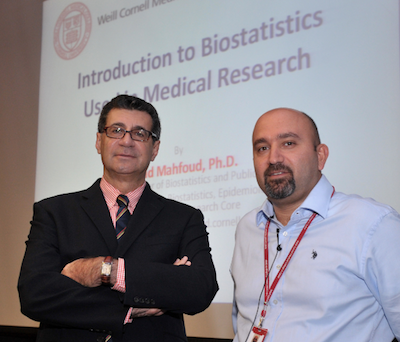Research course a hit with medical professionals
November, 2013

Dr. David P. Hajjar, Rhodes professor of cardiovascular biology
and genetics and dean emeritus of the Weill Cornell Graduate
School of Medical Sciences in New York City, with Dr. Ziyad
Mafoud, associate professor of public health at WCMC-Q.
A training course in biomedical research methodologies delivered by WCMC-Q in partnership with HMC returned for a second year by popular demand.
Entitled ‘Concepts in Biomedical Research Methodologies for Students, Research Fellows and Faculty’, the course comprised 16 lectures delivered by WCMC faculty from both the Qatar and New York campuses.
The lectures were given on weekdays from during October and November at HMC’s Education Center, and addressed subjects such as Fundamentals of Research Methodology, Logic and Study Design; Biostatistics in Medical Research; Drug Development and the Role of Technology Transfer; Fundamental Aspects of Discovering New Research Funding Sources; and Analysis of Clinical Research Papers.
Last year’s course was held at WCMC-Q and attracted 166 subscribers. This year, more than 400 healthcare professionals and students applied for the 300 available places on the course. These participants came primarily from HMC, WCMC-Q and Qatar University, and included physicians, scientists, healthcare professionals and students.
The course is directed by Dr. David P. Hajjar, Rhodes professor of cardiovascular biology and genetics and dean emeritus of the Weill Cornell Graduate School of Medical Sciences in New York City. Dr. Hajjar presented five lectures himself and two in conjunction with his colleague from New York, Dr. Brian Lamon. The other lecturers from New York were Dr. Lisa Kern, Dr. Randi Silver and Dr. Curtis Cole, while WCMC-Q was represented by Dr. Ziyad Mafoud and Dr. Amal Khidir.
Dr. Hajjar explained the purpose of the program.
“The course focuses on material not always stressed in medical or graduate school, with topics including responsible conduct of research, drug design, biostatistics, translational informatics and clinical research,” he said. “This program on the fundamentals of research methodologies affords both the junior and senior physician-scientist opportunity to hear about the challenges of conducting first-rate research, managing obstacles involving research funding, conflicts of interest, and compliance.
“Most importantly, the course demonstrates how they, the next generation of scientific investigators in Doha, can successfully establish their imprint on the pathway of medical discoveries.”
The course, which was sponsored by HMC, will be run at the HMC Education Center once again in the fall of 2014.
Dr. Hajjar expressed his satisfaction at the continued success of the program. He said: “We are extremely pleased to have attracted so many healthcare professionals and to have received such positive feedback about the course. It is really very encouraging to see how much interest and enthusiasm there is in Qatar for information about research.
“Our aim is to augment the knowledge-base of the participants so that they are able to negotiate the many practical challenges that confront researchers trying to get projects off the ground. People want to know how to move their ideas from the bench to the bedside, and how to progress experimental drugs from the laboratory to the clinic – we aim to give them the tools they need to realize those ambitions.”
